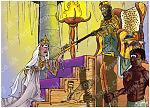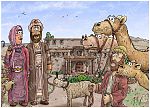Bible Cartoon: <-- Esther : Job -->
Click on Add to cart button below shopping cart.
Purchased Bible Cartoons do not have watermarks. Links to Cartoons provided on email once purchase is completed.Job
Book type: Wisdom
Author: Unknown
No. of chapters: 42
Key character(s): God, Satan, Job, Job’s wife, Eliphaz the Temanite, Bildad the Shuhite, Zophar the Naamathite, Elihu son of Barakel the Buzite. [1]
Brief description: Job – A study in providence and faith.
Theological outline:
01) Prologue: A righteous man can endure injustice without sinning (1:1-2:10)
02) First Round: Will a just God answer a righteous sufferer’s question? (2:11-14:22)
03) Second Round: Does the fate of the wicked prove the mercy & justice of God? (15:1-21:34)
04) Third Round: Can the innocent sufferer ever know God’s ways & will? (22:1-28:28)
05) Job’s Summary: Let God restore the good old days or answer my complaint (29:1-31:40)
06) Elihu: An angry young man defends God (32:1-37:24)
07) Dialogue: Prove your wisdom is sufficient to contend with the eternal Creator (38:1-42:6)
08) Epilogue: Prayer brings reconciliation, forgiveness & restoration (42:7-17)
The meaning of the name Job is doubtful; some conjecturing “object of enmity,” others “he who turns”, or “persecuted”.
Why do bad things happen to good people? That was Job’s question.
Suffering may come suddenly & unexpectedly to anyone. Suffering does not necessarily mean God is angry with or separated from the sufferer. A mystery surrounds much suffering. Human wisdom is severely limited in its ability to explain the ultimate cause of suffering.
His presence reminds us that our Redeemer lives today even after [his own] suffering & dying for us. He understands what we are enduring & gives the ultimate answer – resurrection to life beyond pain.
[Source: NIV Disciple’s Study Bible]
The book of Job (pronounced “jobe”) is one of the wisdom books of the Bible, deals with two issues crucial to every person: the problem of suffering and the sovereignty of God.
The key question in the book of Job asks: “Can a favored, righteous person hold on to their faith in God when things go wrong?” In a conversation with Satan, God argues that such a person can indeed persevere, and points out his servant Job as an example. God then allows Satan to visit terrible trials upon Job to test him.
While suffering is the chief theme of the book, a reason for suffering is not given. Instead, we are told that God is the highest law in the universe and that often his reasons are known only to him.
We also learn that an invisible war is raging between the forces of good and evil. Satan sometimes inflicts suffering on human beings in that battle.
God is good. His motives are pure, although we may not always understand them. God is in control and we are not. We have no right to give God orders.
Appearances are not always reality. When bad things happen to us, we cannot presume to know why. What God wants from us is faith in him, no matter what our circumstances may be. God rewards great faith, sometimes in this life, but always in the next.
[Source: http://christianity.about.com/od/oldtestamentbooks/a/JZ-Book-Of-Job.htm]
[1]
Fuller list of major characters in the book of Job:
| Name | Notes |
| God | Names include Yahweh, Jehovah, “I AM”. Supreme being. Eternal. Creator and sustainer of the universe; omniscient (all knowledge), omnipotent (limitless power), omnipresent (present everywhere), omnibenevolent (unlimited, perfect goodness). |
| Satan | (aka Ha-Satan – “The Satan”; The Devil; “accuser”, “adversary”,”slanderer”; Beelzebub “Lord of Flies”) a fallen angel who rebelled against God. The serpent who seduced Eve into disobeying God’s command. His ultimate goal is to lead people away from the love & obedience of God. |
| Job | Wealthy farmer from Uz. “Blameless & upright”. Had 7 sons & 3 daughters. Suffered terrible loss. |
| Job’s wife | Famous for saying “Are you still holding on to your integrity? Curse God & die!” (Job 2:9) |
| Eliphaz the Temanite | One of Job’s comforters & friend. Supposed to have come from Teman, an important city of Edom, therefore a representative of the wisdom of the Edomites. |
| Bildad the Shuhite | 2nd of Job’s comforters & friend. Descendant of Shuah, son of Abraham and Keturah (Genesis 25:1 – 25:2), whose family lived in the deserts of Arabia. |
| Zophar the Naamathite | 3rd comforter & friend of Job. Resident of Naamah, a Canaanite city. He suggests that Job’s suffering could be divine punishment. Speaks extensively about the consequences of living a life of sin. |
| Elihu son of Barakel the Buzite | Young man, descendent of Buz who may be from the line of Abraham (Genesis 22:20-21 mentions Buz as a nephew of Abraham). Elihu differs from the other antagonists in that his speech illustrates divine providence. |





